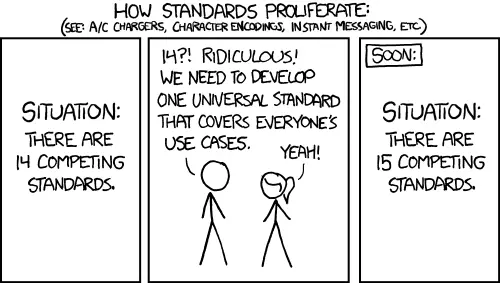Everybody gangsta with the “don’t be evil” clause until the authors turn out to be a nutjob who thinks trans people are blights against God and must be exterminated.
I doubt (or at least hope) that that’s not what they think, but hopefully that illustrates why the clause is dumb.
This gave me a brilliant idea:
- Everyone adds a clause to whatever license they use stating “any part of this software may not be used for war purposes of any kind”
- We wait until software with these licences is spread across the supply chain of everything on Earth
- …
- World peace, as no country would be legally allowed to wage war
“Vladimir Putin, you are under arrest for war crimes.”
“It was a special military operation! It was all the fault of the Nazis!”
“No, not for all that. You’re under arrest for violating the GNU GPL! Prepare to meet your source, licencef*****!!!”
*blam* *blam* *blam*
fun fact: IBM asked for, and got, an exception from that clause.
Source?
I binged this with “ibm json evil”: https://gist.github.com/kemitchell/fdc179d60dc88f0c9b76e5d38fe47076
The FSF also lists any software as non-free which uses the beer license (use the software in any way you want, and should you ever meet the author, pay them a beer).
I thought it was free as in speech not free as in beer? So if it costs a beer then isn’t it still free (as in speech)? Or is this a OSI vs FSF difference?
This is peak licensing
How does one address the paradox that, as JSON itself is evil, one cannot use it for evil?
(opinions may vary on the above; but it’s mine, so nyah nyah.)
It’s less evil than XML or YAML
XML is ok for complex docs where you have a detailed structure and relationships. JSON is good for simple objects. YAML is good for being something to switch to for the illusion of progress.
Meh. I just wish XML was easier to parse. I have to shuttle a lot of XML data back and forth. As far as I can tell, the only way to query the data is to download a whole engine to run a special query language, and that doesn’t really integrate into any of my workflows. JSON retains the hierarchy and is trivially parsed in almost any programming language. I bet a JSON file containing the exact same data would be much smaller also, since you don’t list each tag twice.
It’s still using the lesser of 3 evils, we need a fourth human readable data interchange format.
"Problem: There are
34 standardsObligatory xkcd

YAML is (mostly) a superset of JSON. Is the face hugger any less evil than the alien bursting out of your chest?
It’s got enough serious flaws and quirks that I can feel smug hating on it. JSON is far from perfect, but overall it’s the least worst of human-readable formats.
Only Python manages to get away with syntactical indentation.
The complaints about yaml’s quirks (
noevaluating tofalse, implicit strings, weird number formats, etc.) are valid in theory but I’ve never encountered them causing any real-life issues.





